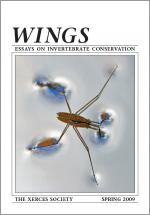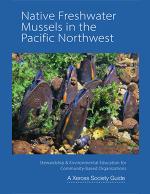As a science-based organization, the Xerces Society produces dozens of publications annually, all of which employ the best available research to guide effective conservation efforts. Our publications range from guidelines for land managers, to brochures offering overviews of key concepts related to invertebrate conservation, from books about supporting pollinators in farmland, to region-specific plant lists. We hope that whatever you are seeking—whether it's guidance on making a home or community garden pollinator-friendly, advice on developing a local pesticide reduction strategy, or detailed information on restoring habitat—you will find it here!
Find Publications
Use the search functions to sort by publication type (books, guidelines, fact sheets, etc.), location, and/or subject (agriculture, gardens, pollinators, pesticides, etc.).
This report aims to inform government agencies charged with biodiversity protection, as well as conservation organizations and the public in general about the threats to and current conservation status of this much-loved, iconic insect.
Developing an Invertebrate-Based Monitoring Tool to Assess the Biological Integrity of Pacific Northwest Freshwater Wetlands
Our Fall 2008 issue of Wings Magazine includes articles on grasshoppers, freshwater mussels, pollinator conservation, and more.
Essays on Invertebrate Conservation
The Spring 2009 issue of Wings Magazine includes articles on ephemeral water holes, photographing butterflies, deep-sea corals, and more.
Essays on Invertebrate Conservation
There are many threats to the invertebrates with which we share this planet. Habitat loss, disease, and pesticide use are immediate risks, but overlaying everything is climate change, the consequences of which may unravel the fabric of our environment.
A Guide to the Essential Steps for Protecting Freshwater Mussels in Aquatic and Riparian Restoration, Construction, and Land Management Projects and Activities
Best Management Practices for Protecting Native Western Freshwater Mussels During Aquatic and Riparian Restoration, Construction, and Land Management Projects and Activities
This publication draws from the expertise of members of the Pacific Northwest Native Freshwater Mussel Workgroup, western restoration practitioners, and aquatic biologists, and provides guidance and resources for a range of topics, from incorporating freshwater mussels into project planning, surveying for mussels, implementing best management practices, and performing salvages and relocations at restoration sites.
Stewardship and Environmental Education for Community-based Organizations
Conducting research with trained volunteers (citizen scientists) is an increasingly popular and successful model for gathering data while increasing public science education and connecting people with nature where they live and play. Xerces has used this model to develop effective protocols for volunteer-based mussel surveys. Our work has helped address existing gaps in capacity and education, but there are many opportunities to work with new partners in additional watersheds and across cultures. Native Freshwater Mussels in the Pacific Northwest is a guide to help those organizations in their restoration and conservation work.









